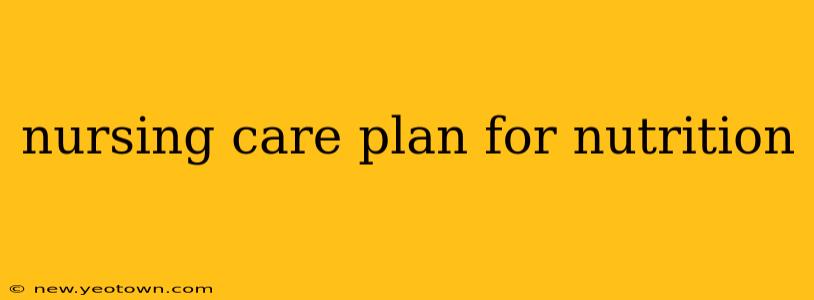A Holistic Approach to Nutritional Care: Crafting a Comprehensive Nursing Care Plan
Imagine Sarah, a 70-year-old recovering from a stroke. She struggles to swallow, feels fatigued, and has lost a significant amount of weight. Providing Sarah with adequate nutrition is crucial for her recovery. This isn't just about counting calories; it's about creating a comprehensive nursing care plan that addresses her individual needs and promotes her overall well-being. This plan will act as a roadmap, guiding us through the complexities of ensuring Sarah gets the nourishment she needs to thrive.
Assessing Nutritional Needs: The Foundation of the Plan
Before we even begin crafting a care plan, we need a thorough assessment. This isn't a one-size-fits-all approach. We need to consider Sarah's specific situation. This involves:
- Dietary History: What did Sarah typically eat before her stroke? Are there any cultural or religious dietary preferences we need to accommodate? What are her current likes and dislikes? Understanding her past habits helps us tailor a plan that feels familiar and approachable.
- Physical Assessment: We'll check her weight, height, and BMI to calculate her nutritional status. We'll also assess her muscle mass, skin turgor (checking for dehydration), and overall energy levels. Observing her swallowing difficulties firsthand is crucial.
- Biochemical Data: Blood tests can reveal deficiencies in vitamins, minerals, or proteins. These results are essential for identifying specific nutritional needs.
- Social Factors: Does Sarah live alone? Does she have the support she needs to prepare and eat meals? Are there financial limitations affecting her food choices? Social circumstances profoundly influence a patient's ability to adhere to a nutritional plan.
Developing the Care Plan: A Personalized Approach
Based on Sarah's assessment, we can develop a tailored nursing care plan, focusing on several key areas:
1. Nutritional Goals: These are SMART goals – Specific, Measurable, Achievable, Relevant, and Time-bound. For Sarah, examples might include:
- "Gain 2 pounds per week for the next 4 weeks."
- "Maintain hydration by consuming at least 64 ounces of fluid daily."
- "Demonstrate improved swallowing function by week 2, as assessed by speech therapy."
2. Interventions: These are the actions we'll take to achieve those goals. For Sarah, some interventions could include:
- Dietary Modifications: Speech therapy consultation to assess swallowing ability and recommend appropriate food textures (pureed, soft, etc.). Collaboration with a registered dietitian to develop a personalized meal plan that addresses her nutritional deficiencies and swallowing limitations.
- Nutritional Support: If oral intake is insufficient, we might consider supplemental nutrition through enteral feeding (tube feeding) or parenteral nutrition (intravenous feeding).
- Medication Management: Certain medications can affect appetite or nutrient absorption. We need to assess and manage any potential drug interactions.
- Education and Support: Educating Sarah and her family about her nutritional needs and the importance of adhering to the plan. Providing resources and support to ensure she feels empowered and confident in managing her nutrition.
3. Evaluation: We need to regularly monitor Sarah's progress and adjust the plan as needed. This could involve:
- Regular weight checks and monitoring of other physical parameters.
- Assessment of her appetite, energy levels, and tolerance of the prescribed diet.
- Review of biochemical data to assess the effectiveness of the nutritional interventions.
Addressing Specific Challenges: Common Questions in Nutritional Care
How do I handle dysphagia (swallowing difficulties) in a nutritional care plan?
Dysphagia requires specialized interventions. This often involves collaborating with a speech-language pathologist to determine the appropriate diet consistency and swallowing techniques. Modifications might range from pureed foods to thickened liquids, depending on the severity of the dysphagia.
What are the signs of malnutrition?
Malnutrition can manifest in various ways, including unintentional weight loss, muscle wasting, decreased energy levels, edema (swelling), dry skin, and brittle hair. Laboratory tests can also identify deficiencies in specific nutrients.
How can I ensure a patient adheres to their nutritional care plan?
Patient education and support are paramount. Involving the patient and their family in the planning process promotes adherence. Addressing concerns, providing practical strategies, and offering emotional support can improve compliance. Regular monitoring and adjustments to the plan, based on the patient's feedback and progress, are also crucial.
What role do family members play in a patient's nutritional care?
Family members play a crucial role in providing support and encouragement. They can help prepare meals, monitor food intake, and provide emotional support. Involving them in the education process empowers them to participate actively in their loved one's care.
By meticulously addressing each aspect, from initial assessment to ongoing evaluation, we can develop a robust and personalized nursing care plan for nutrition that significantly impacts Sarah's recovery and overall well-being. It’s not just about providing nourishment; it's about fostering health and enhancing the quality of life.

